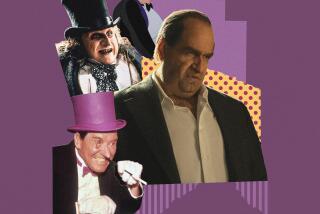How Matt Reeves built a better franchise with âWar for the Planet of the Apesâ

Every filmmaker has a unique origin story. Matt Reevesâ involves Super 8 cameras and dolphins.
One day, when Reeves was around 8 years old, his grandparents took him on a trip to a Southern California ocean-themed entertainment park called Marineland of the Pacific.
âThere were some tourists filming dolphins with an 8-millimeter camera, and it hit me like a lightning bolt,â Reeves recalled on a mid-June morning in his office on the 20th Century Fox lot. âI thought, âWow, theyâre going to have the dolphins! Any time they want, they can put the dolphins on their wall!â I was blown away by that. My grandfather sent me my fatherâs old wind-up 8-millimeter camera, and that was it. I never turned back.â
Forty-odd-years later, Marineland has long since closed but Reevesâ passion for capturing stories on film has never dimmed. The only difference is that the technology has advanced â and, for the moment at least, Reeves is all about apes, not dolphins.
On Friday, Reevesâ latest film, âWar for the Planet of the Apes,â will ride into theaters like a silverback gorilla on horseback, boosted by the kind of enthusiastic buzz any director of a summer blockbuster would kill for. The third installment in the recently rebooted sci-fi series â and the second to be directed and co-written by Reeves, following 2014âs smash âDawn of the Planet of the Apesâ â the film brings the ongoing struggle between humans and sentient simians to a head, as the ape leader Caesar (Andy Serkis) squares off against a ruthless colonel (Woody Harrelson).
Part âApocalypse Nowâ-style meditation on the madness of war and part Sergio Leone-esque western, with a dollop or two of biblical epic added for good measure, âWar for the Planet of the Apesâ is a headier, more ambitious concoction than one typically expects from summer-tentpole fare these days. But as Reeves sees it, the franchiseâs secret sauce is its ability to sneak in meaty stories and nuanced characters under the cover of talking apes.
I feel incredibly privileged to be part of a blockbuster movie where it is an intelligent take ... you can connect with an audience in a real and visceral way.
— Andy Serkis
âIf it werenât for the fact that we have photorealistic apes in the story, we wouldnât be able to make this movie,â said Reeves who, largely on the strength of his work on the âApesâ franchise has been tapped by Warner Bros. to helm a planned solo Batman movie. âIt wouldnât be a $190-million Fox movie. But watching these apes and feeling their humanity â it creates just enough distance and enough spectacle that the audience is really excited about seeing that kind of thing.â
Dating to 1968âs original âPlanet of the Apesâ â with a few goofy, misbegotten sequels, spinoffs and attempted reboots along the way â the âApesâ franchise may seem an unlikely candidate for such serious treatment all these years later. But from the moment he came on board, following Rupert Wyattâs successful 2011 reboot âRise of the Planet of the Apes,â Reeves saw the thematically rich, even Shakespearean potential in the franchise.
âOn âDawn,â Matt just went with the drama, and thatâs been his maxim all the way through,â said Serkis, whose performance-capture work as Caesar has drawn widespread acclaim. âWhen you look at whatâs around, I feel incredibly privileged to be part of a blockbuster movie where it is an intelligent take, where you can connect with an audience in a real and visceral way and not have it be just purely entertainment. Itâs such a tonic and a wake-up call.â
Indeed, in a summer that has seen a number of would-be blockbusters such as âThe Mummyâ and âKing Arthur: Legend of the Swordâ take it on the chin at the box office, âApesâ producer Dylan Clark believes Reevesâ effort to elevate the âApesâ franchise will be rewarded, as it was with âDawn,â which grossed $710 million worldwide.
âWhen youâre doing big spectacle tentpole movies, it could be easy just to let the visual effects and the noise take over,â Clark said. âBut what weâre seeing is that the audience wants to connect emotionally. If you have a director like Matt, whose empathy is the thing that leads him into the story, chances are theyâre going to connect to the characters.â
The only thing you can really do is dig down as deep as you can to present as personal a version of that story that resonates with you.
— Matt Reeves
In conversation, Reeves comes across as genial but somewhat shy and soft-spoken. (âIâm a naturally anxious, nervous person,â he said.) Even though his temperament may be at odds with the stereotypical image of the hard-charging, alpha director, no one should underestimate him for a moment, said âApesâ producer Peter Chernin.
âMatt is very quiet â Iâve never seen him raise his voice or even be particularly tough,â Chernin said. âBut he has a very singular vision. Heâs one of the rare people Iâve ever met whoâs both a big effects-driven spectacle filmmaker and also a phenomenal actorsâ director.â
That said, Reevesâ ascent to the top ranks of Hollywood filmmakers has hardly been a straight line. In recent years, studios have been turning with increasing frequency to relatively untested young directors to helm tentpole films, the most recent example being Jon Watts, who leaped directly from the low-budget, little-seen âCop Carâ to this monthâs âSpider-Man: Homecoming.â At 51, Reeves has been plugging away in film and television for more than 20 years in what he called âa long, weird, circuitous journey.â
Early in his career, inspired by the auteur-driven cinema of the â70s, Reeves imagined himself making idiosyncratic, personal movies in the vein of Hal Ashby, who directed such films as âHarold and Maude,â âShampooâ and âBeing There.â But when his directorial debut, 1996âs David Schwimmer-Gwyneth Paltrow romantic comedy âThe Pallbearer,â landed with a resounding thud, his hopes of being celebrated as an exciting new voice in cinema quickly faded.
âYou have all these dreams â youâre going to break in and make your first big statement â and very rapidly it all collapsed,â he said. âIt was a shocking thing. I didnât know how I was going to recover â or if I was going to recover. But what it taught me was tenacity. It created a tremendous urgency to find a way to continue.â
Reeves pivoted to television, co-creating the series âFelicityâ with his longtime pal J.J. Abrams, whom he had befriended at age 13 over a shared love of making Super 8 movies. In 2007, more than a decade after his filmmaking career had exploded on the launching pad, Reeves was asked by Abrams if heâd be interested in directing a found-footage monster movie he was producing called âCloverfieldâ â a project that seemed far outside Reevesâ wheelhouse.
âI was like, âWhat are you talking about? Why should I direct this movie?â â Reeves said. âJ.J. said, âBecause youâre going to try to ground it and make it real â thatâs what you do.â â
Made for just $25 million, the film grossed $170 million. Much to his surprise, Reeves was suddenly considered a genre filmmaker, a reputation he cemented with his well-received 2010 teenage vampire film âLet Me In,â a remake of the Swedish film âLet the Right One In.â
Review: âWar for the Planet of the Apesâ is a work of stunning blockbuster artistry Âť
Having grown up loving films like âStar Warsâ and âPlanet of the Apes,â Reeves has come full circle and now fully embraces sci-fi, horror and fantasy. âAt the beginning of my career, I donât think I understood just how personal genre could be,â said the director, who is helping develop a TV series based on Justin Croninâs bestselling vampire novel, âThe Passage.â
As he looks ahead to his Batman movie, Reeves is well aware that the stakes for his career have been raised far beyond anything he ever imagined as a little kid watching tourists film dolphins on their Super 8 cameras. In todayâs Hollywood, a superhero film has the potential to either send a directorâs career soaring or bring it crashing to earth in a single weekend.
âThere are definitely âApesâ fans who are excited to see this movie, but itâs not the same thing as a Marvel fan or a DC fan,â Reeves said. âThere is a lot of pressure. But thereâs no possible way to give everyone what theyâre expecting because everybody is expecting something different. The only thing you can really do is dig down as deep as you can to present as personal a version of that story that resonates with you. At least thatâs my approach.
âI never thought I would be making these kinds of movies,â he continued. âThe path of my career has been totally unexpected to me. And yet itâs all been rooted in the same thing, which was to try to feel my way through instinctually to the kinds of stories that I can relate to.â
He shrugged. âItâs a funny path but I guess thatâs the way it always is, right?â he said. âThings never happen exactly the way that you imagine they will.â
Twitter: @joshrottenberg
ALSO
Motion picture academy opens its doors to 774 new members as push for diversity continues
More to Read
Only good movies
Get the Indie Focus newsletter, Mark Olsen's weekly guide to the world of cinema.
You may occasionally receive promotional content from the Los Angeles Times.











